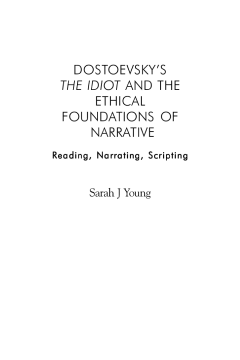
Additional Information
Book Details
Abstract
In considering Dostoevsky's 'The Idiot', a novel less easily defined in terms of plot and ideas than his other major fictional works, Sarah Young addresses problems in the novel unresolved by previous interpretations, and in doing so fills a significant gap in Dostoevsky studies. 'Dostoevsky's The Idiot and the Ethical Foundations of Narrative' provides an innovative theoretical framework for an analysis that integrates structural and narratological considerations with thematic (religious and ethical) aspects, by focusing on the characters' interactivity as the most fundamental level on which the ethical systems of the novel are enacted. It examines the questions of what ethical bases are put forward by the novel, what faith-issues and philosophical world-views they derive from, and how, in terms of structuring and narration rather than simply thematically, they are presented in the novel.
'Original, well argued, convincing and attractively written throughout.' —Malcolm Jones, Professor Emeritus, Department of Russian and Slavonic Studies, University of Nottingham
'A truly outstanding and original piece of work.' —Robin Feuer Miller, Edytha Macy Gross Professor of Humanities, Brandeis University
In considering Dostoevsky's 'The Idiot', a novel less easily defined in terms of plot and ideas than his other major fictional works, Sarah Young addresses problems in the novel unresolved by previous interpretations, and in doing so fills a significant gap in Dostoevsky studies. 'Dostoevsky's The Idiot and the Ethical Foundations of Narrative' provides an innovative theoretical framework for an analysis that integrates structural and narratological considerations with thematic (religious and ethical) aspects, by focusing on the characters' interactivity as the most fundamental level on which the ethical systems of the novel are enacted. It examines the questions of what ethical bases are put forward by the novel, what faith-issues and philosophical world-views they derive from, and how, in terms of structuring and narration rather than simply thematically, they are presented in the novel. For the first time, through the concept of scripting, the author shows how the ethical becomes the foundation for the narratological in The Idiot. No other book on Dostoevsky has addressed the question of ethics, which is so important to the study of Dostoevsky, particularly in the light of recent work on the religious dimension of his novels, within the context of narrative and Bakhtinian dialogue. This substantial new work will appeal to academics, postgraduates and undergraduates working on Dostoevsky and the nineteenth- and twentieth-century Russian novel in general; as well as scholars in the fields of literary theory, including Bakhtin studies, narratology, literature and ethics.
Sarah Young is a Leverhulme Special Research Fellow in the Department of Russian and Slavonic Studies at the University of Nottingham, UK.
